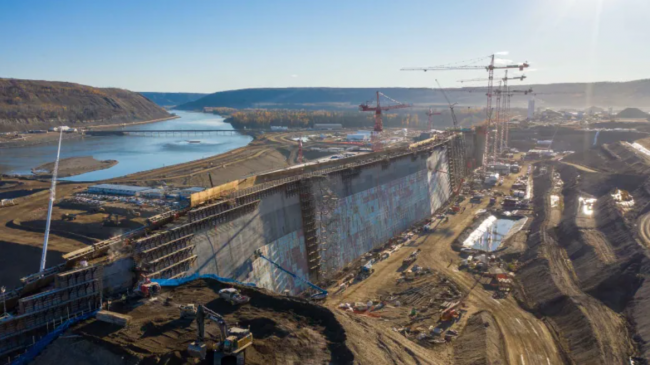Articles Menu

Jun 27, 2022
The West Moberly First Nations have reached a partial agreement with B.C. Hydro and the provincial and federal governments over a lawsuit that says the massive Site C hydroelectric dam in northeastern B.C. would destroy their territory and violate their rights.
A joint statement from the provincial and federal governments released Monday afternoon said the settlement includes an impact and benefits agreement between B.C. Hydro and West Moberly First Nations plus two agreements providing contracting opportunities.
It will also see 5,000 acres of provincial Crown land transferred to the First Nation and an agreement to release West Moberly's claims against the Site C project.
The agreement is a settlement with the federal government, but the claim that the existing dams on the Peace River infringe on West Moberly's treaty rights will be paused to try to negotiate a settlement.
Chief Roland Willson sighed as he explained what the partial settlement means for his people.
"We've, as a community, come to a realization that they're not stopping," he said. "[We're] painfully aware that we've lost the valley."
The third in a series of four dams in B.C.'s Peace River region, Site C was first proposed in the 50s, shelved twice in the 80s and brought back to life by former B.C. Liberal premier Gordon Campbell in 2010.
Approximately 5,500 hectares of land will be flooded, destroying farmland, wildlife habitat and territory occupied by Treaty 8 First Nations. Construction on Site C, about 14 kilometres southwest of Fort St. John, began in 2015.
The West Moberly First Nations filed a civil claim against the B.C. government, B.C. Hydro and the attorney general of Canada in 2018 and lost a bid for an injunction order that same year.
NDP Leader John Horgan opposed the Site C Dam before he was elected premier but ultimately decided to forge ahead once in office — despite a report from the B.C. Utilities Commission that recommended alternatives.
Last year, Horgan said the province would lose over $10 billion in sunk costs if it decided to reverse course as the estimated cost of building the dam ballooned to around $16 billion, nearly double the $8.775 billion approved by the province in 2014.
Willson said he was reluctant to settle out of court, but his community felt it was out of options.
"It's hard to discuss because the project should never have happened," he said. "All of the nations in Treaty 8 approached the [former B.C.] Liberal government with the concept of working together on a project to develop energy for the province, but they had their mind set on Site C."
"They wrote the British Columbia Utilities Commission out of the process so they couldn't turn it down a third time."

In a statement to CBC, B.C. Hydro president and CEO Chris O'Riley acknowledged the settlement was a "difficult decision" for the West Moberly First Nations.
"Building respectful and meaningful relationships with West Moberly First Nations and all Treaty 8 First Nations impacted by Site C is a priority for BC Hydro," O'Riley said. "These agreements provide us a foundation to move forward together in a manner that fosters a mutually beneficial relationship."
B.C. Energy Minister Bruce Ralston also acknowledged West Moberly's concerns in a news release but said he believes the agreements recognize and mitigate the impacts of the Site C project on the First Nations while ensuring they benefit from the project.
Ralston's office said West Moberly will receive a one-time lump sum payment and ongoing payments during Site C's first 70 years of operation, as well as 5,000 acres of Crown still to be identified.
Chief Willson says he's ready to turn the page, but he maintains the Peace River dams disregard the provisions of Treaty 8.
"This is a clear violation of the treaty and a clear infringement of our treaty rights," he said.
Willson said the Moberly First Nations will now focus their efforts on healing — with their people and the land that's left — and protecting their lifestyle in the face of ongoing development in Treaty 8 territory.
"After long talks and discussions, we have decided that we're going to have to move on to the next chapter and go from there."
[Top: This photo from the fall of 2021 shows the progress being made on the construction of the $16 billion Site C dam. (B.C. Hydro/submitted)]